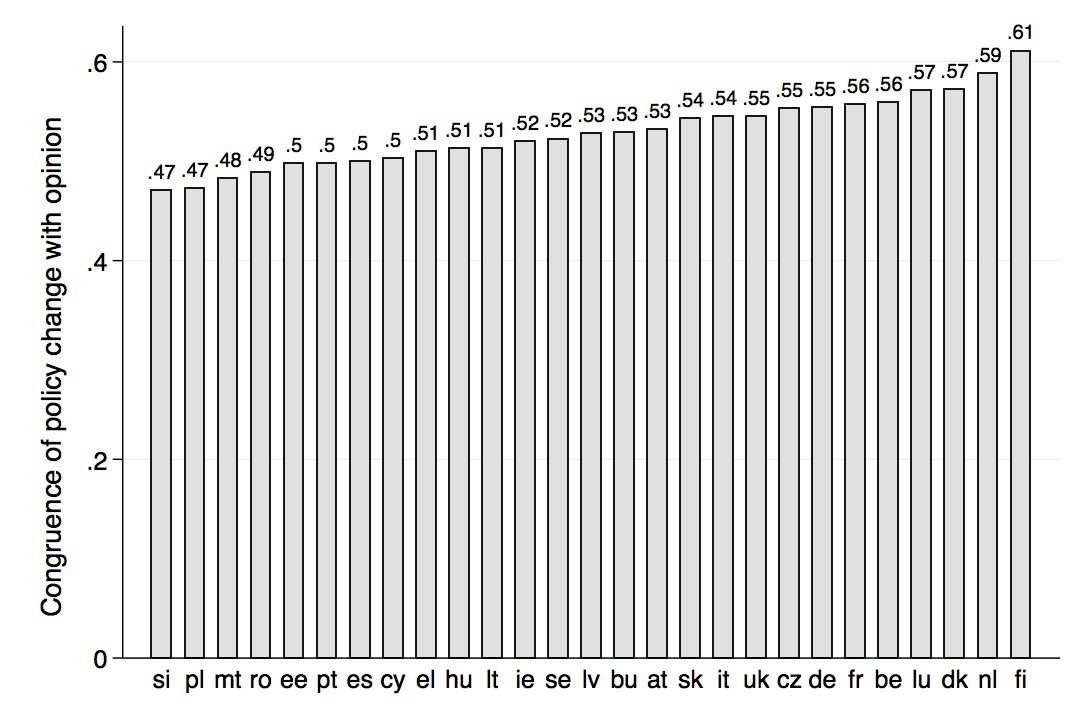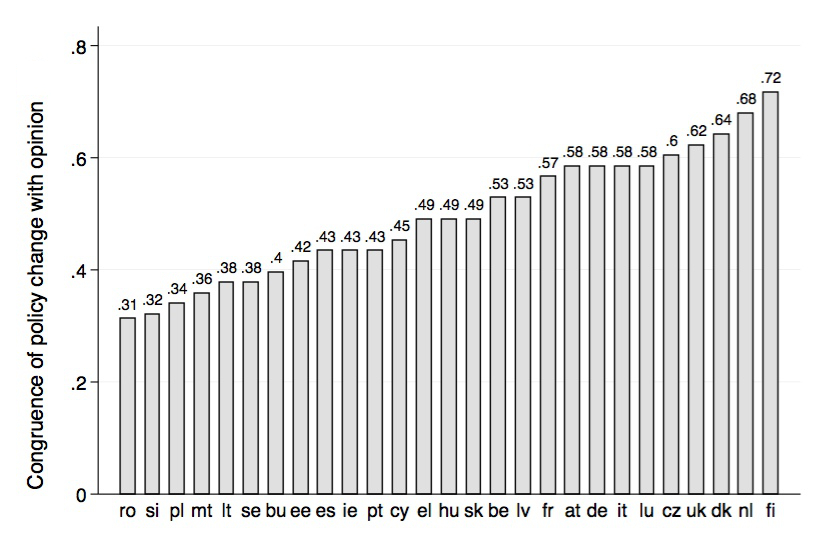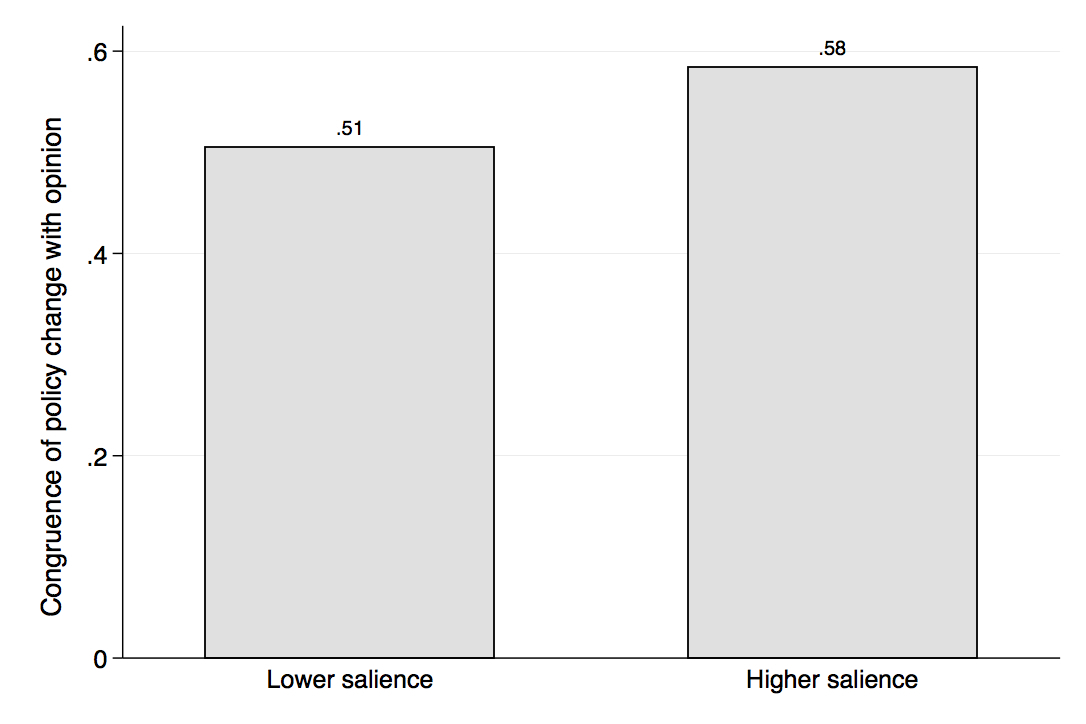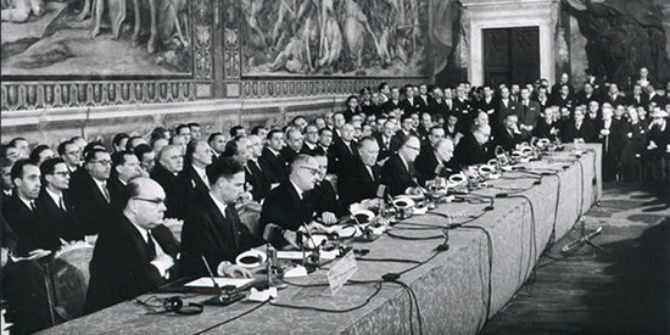 A common criticism of the EU is that Britain lacks influence in Brussels and Strasbourg and can be overruled by other nations. Christopher Wratil uses data from Eurobarometer surveys to analyse whether the EU does act in accordance with public opinion and, specifically, how well the views of UK citizens are represented compared to citizens in other EU countries.
A common criticism of the EU is that Britain lacks influence in Brussels and Strasbourg and can be overruled by other nations. Christopher Wratil uses data from Eurobarometer surveys to analyse whether the EU does act in accordance with public opinion and, specifically, how well the views of UK citizens are represented compared to citizens in other EU countries.
As the EU referendum approaches, both sides of the campaign try to sway voters with yet another argument about the economy, jobs, trade, immigration, sovereignty, or bureaucracy. Key among the Leave campaign’s arguments is the idea that the EU is an undemocratic, unaccountable bureaucracy, dominated by the Eurozone, with little UK influence. As the UK does not have a national veto in most policy areas, Vote Leave fears that if the “EU decides to introduce a law that will be bad for Britain there is nothing we can do to stop it”.
Clearly, on the level of pure vote calculations it seems evident that with 8% of the votes in the Council or 10% of the members in the European Parliament, UK representatives cannot stop legislation that a majority in both institutions supports under the ordinary legislative procedure. However, this could be said of any single EU country. Just replace “UK” and the percentages in the sentence above with those of any other country and it remains correct. While a national veto could potentially stop any law “we disagree with”, it also leads to gridlock in an EU of conflicting views from London to Athens that can only be overcome by compromises, package deals, and mutual concessions. Hence, for those horrified by the very possibility that some laws may not reflect the views of UK citizens, staying in a union of diverse states may not be a good idea.

But if you are willing to accept the give and take for the benefits of cooperation, a prime concern may be how well UK interests are represented in the EU. Does the EU only make laws German citizens want? Do UK citizens get their views implemented less often than other nationals? The figure below provides some evidence. It is created from a dataset of 171 policy issues that were discussed in the EU between 2004 and 2010. For each, the Eurobarometer surveyed national publics in all country on what should be done about the issue.
For instance: Should the EU introduce a tax on financial transactions? Should Ukraine join the EU? Should national safety regulations for nuclear power stations be harmonised across Europe? The figure shows how often the EU acted congruently with the views of the majority of citizens in a country within the next five years.
This reveals that UK citizens are no outliers in terms of overall representation. The EU acted in accordance with their majority opinion in 55% of the cases, giving them ninth place in terms of view fulfillment. In contrast, Slovenian or Polish citizens only see their views implemented on 47% of policy issues.
Interestingly, the differences between countries are rather small. The rate of congruent policy change can further be broken down by policy area. This reveals that the views of UK citizens are especially well represented in constitutional affairs (e.g. competence transfer, development of treaties) and EU enlargement to new countries. The figure below shows that the UK is among the best-represented countries on these issues, with 62% of actions in line with citizens’ opinion. In contrast, UK citizens are losing out compared to others on internal market and consumer protection, where policy congruence is only about 30%, while Austria and the Netherlands – frontrunners on these issues – achieve 45%.
Statistical analyses of the whole dataset reveal that the probability of EU policies being congruent with citizens’ views is higher for those countries that are net contributors to the EU budget, especially on questions regarding EU spending. This advantage also applies to the UK. The analyses also show that the clearer public opinions, i.e. the more people are in favour or against a policy, the more likely it is that the EU will act congruently.
In the same vein, salience is also important: if more citizens are interested in a policy issue and provide their opinion on it, it becomes more likely that citizens’ views and EU policies are alike. For the UK this is demonstrated in the figure below, which divides the sample into two halves, one made up of policy issues of above median salience, and the other containing issue with below median salience. This shows that congruence on the more salient issues was 58%, while it was only 51% on the less salient issues.
The data presented here cannot tell us whether the EU is doing any better or worse than the UK political system in representing British citizens. Nor can they tell us whether the EU is sufficiently“democratic”. But what they do show succinctly is that within the existing structures of EU democracy, UK citizens are by no means underrepresented when we compare them with citizens in other EU countries. At least according to the limited data we have, overall levels of policy congruence are surprisingly homogenous across countries with the UK ranking between midfield and first third. Some national publics get more of what they want in some areas and less in others, and they tend to get more, when it is more important to them.
This post represents the views of the author and not those of the BrexitVote blog, nor the LSE.
Christopher Wratil is a PhD candidate at the European Institute of the LSE and a member ofFutureLab Europe. His research focuses on citizen representation in the European Union.










1 Comments